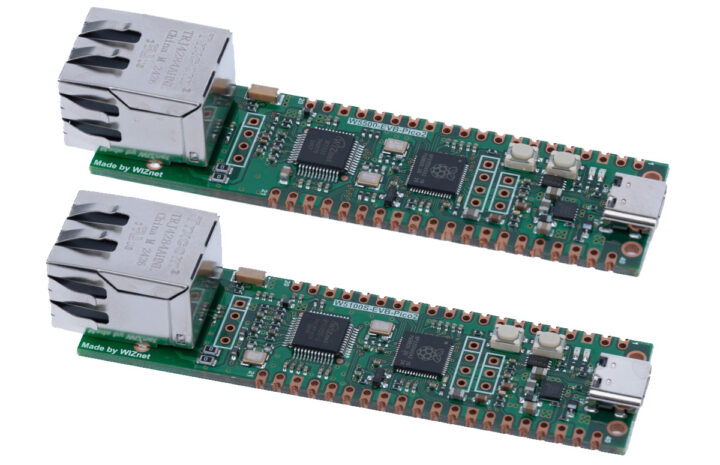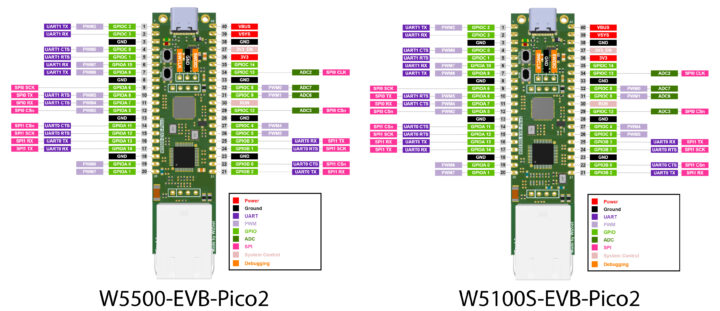WIZnet has recently launched two new Raspberry Pi RP2350-based Ethernet boards – W5100S-EVB-Pico2 and W5500-EVB-Pico2 – based on different Ethernet controllers. The entry-level W5100S-EVB-Pico2 is built around the W5100S controller that features 4 independent sockets and 16 Kbytes of buffer memory. On the other hand, the W5500-EVB-Pico2 is built around the W5500, which features 8 sockets, 32 Kbytes of buffer memory, and improved security features such as OTP memory, Secure Boot, and Arm TrustZone technology. These make the W5500-EVB-Pico2 ideal for projects with robust network handling and advanced security measures.
After the recent announcement of the $5 Raspberry Pi Pico 2 we have seen many development boards built around the RP2350 MCU, including the Challenger+ RP2350 WiFi6/BLE5, the Solder Party’s RP2350 Stamp, the Seeed Studio XIAO RP2350, the Cytron MOTION 2350 Pro, and more. Feel free to check those out If you are interested in RP2350-based dev boards.
W5100S-EVB-Pico2 and W5500-EVB-Pico2 specifications
- Microcontroller – Raspberry Pi RP2350A
- CPU – Dual-core Arm Cortex-M33 processor @ 150MHz (RISC-V cores are not mentioned, so they are likely not used at all)
- Memory – 520KB internal RAM
- 8KB OTP Storage
- Storage – 16Mbit SPI flash
- Ethernet
- W5100S-EVB-Pico2 (10/100 Mbps Ethernet with Auto-Negotiation (Full/Half Duplex) and RJ45 connector)
- W5100S Hardwired TCP/IP CHIP
- Supports TCP, UDP, WOL over UDP, ICMP, IGMPv1/v2, IPv4, ARP, PPPoE
- 4 Independent Hardware SOCKETs
- Internal 16 Kbytes Memory for TX/ RX Buffers
- W5500-EVB-Pico2 (10/100 Mbps Ethernet with Auto-Negotiation (Full/Half Duplex) and RJ45 connector)
- W5500 Hardwired TCP/IP CHIP
- Supports TCP, UDP, ICMP, IGMP, IPv4, ARP, PPPoE
- 8 Independent Hardware SOCKETs
- Internal 32 Kbytes Memory for TX/ RX Buffers
- Both – High-Speed Serial Peripheral Interface (SPI MODE 0, 3)
- W5100S-EVB-Pico2 (10/100 Mbps Ethernet with Auto-Negotiation (Full/Half Duplex) and RJ45 connector)
- USB – 1x USB C-Type port for power, data, and reprogramming Flash
- I/Os
- 40 pin 0.1″ through-hole pins and edge castellations with
- 2x UART, 2x SPI, 2x I2C
- 16x PWM
- 4x 12-bit 500ksps Analogue to Digital Converter (ADC)
- 3x Programmable IO (PIO) blocks, 12 state machines total
- HSTX peripheral
- 1x Timer with 4 alarms,
- 1x Real Time Counter
- 40 pin 0.1″ through-hole pins and edge castellations with
- Security – OTP, Secure Boot, Arm TrustZone
- Debugging – SWD headers
- Power Supply
- Built-in Switch-mode DC-DC converter (replacing LDO for enhanced power efficiency)
- VBUS – DC 5V (+/- 10%)
- VSYS – 4.3V to 5.5V
- Built-in Switch-mode DC-DC converter (replacing LDO for enhanced power efficiency)
- Dimensions – 80 x 20mm
- Operation Conditions
- Max Operating Temperature – 85°C (including self-heating)
- Min Operating Temperature: -20°C
- Recommended max ambient temperature: 70°C
- Certification – CE, FCC, AWS Qualification, Microsoft Azure Certification
One thing to note is that GPIO16-21 is dedicated to Ethernet on both boards. More information about the W5100S-EVB-Pico2 and W5500-EVB-Pico2 can be found on their respective Wiki Pages including C/C++ code samples for Ethernet, AWS, Azure, and LwIP.
As of this writing, the board has just been released on Mouser and DigiKey. On Mouser, the W5100S-EVB-Pico2 and W5500-EVB-Pico2 are priced at $19.24 in single quantities. The W5100S model is also listed on DigiKey, but there is a minimum order requirement of 20 units, bringing the total cost to $280.59, which translates to a per-unit price of $14.03.
Debashis Das is a technical content writer and embedded engineer with over five years of experience in the industry. With expertise in Embedded C, PCB Design, and SEO optimization, he effectively blends difficult technical topics with clear communication
Support CNX Software! Donate via cryptocurrencies, become a Patron on Patreon, or purchase goods on Amazon or Aliexpress






